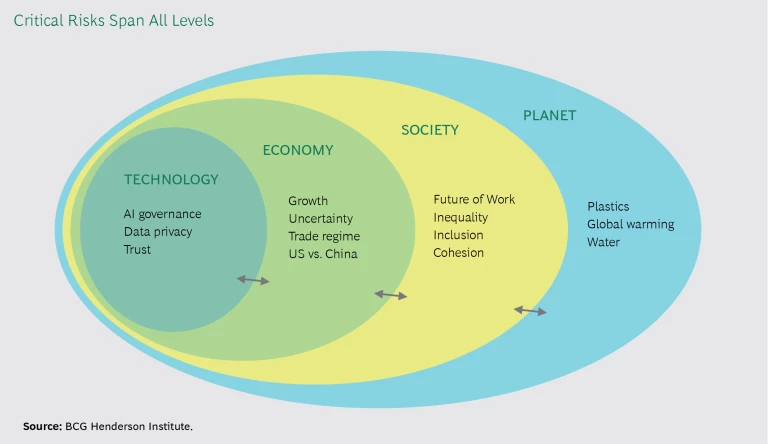As the World Economic Forum meeting in Davos draws to a close, I’ve been reflecting on a week of rich and wide-ranging discussions, and what it all means for business. The tenor of the meeting was foreshadowed by the IMF’s press conference at the beginning of the week, which pointed to a gradual trending down of growth as the most likely scenario—and warned of elevated risks on multiple fronts. Most of Davos was spent discussing those risks.
The environment in which global organizations operate is a nested system comprising several levels: technologies, which are part of economies, which are part of societies, which are part of the planet. The risks discussed this week spanned all of these levels.
At the level of technology, we heard about risks associated with algorithmic governance, data privacy, cybersecurity, and trust. At the level of the economy, we heard about declining growth, increasing uncertainty, and challenges to the international trade regime. At the level of society, we heard about risks associated with the impact of AI on work, rising inequality within nations, and a breakdown of social cohesion. And at the level of the planet, we heard about risks from plastic pollution, fresh water scarcity, and global warming.
Many of the issues are well-defined, and some even have well-defined solutions. But most of them require collaboration and collective action.
These risks share a few important characteristics. Most of them are not new—although many seem more pressing than they did last year. Levels interact with each other, so it is not possible to focus on one area without considering the others; in other words, businesses need to take a much broader view of their environment. Many of the issues are well-defined, and some even have well-defined solutions. But most of them require collaboration and collective action. While we might once have depended on governments for this, business now needs to be part of the solution, given fractious politics and social division.
So what does this all mean for business? I came away with six imperatives:
- Business leaders will need to focus on resilience to cope with a wide range of plausible trajectories for the global economy.
- Balancing this, they will also need to focus on innovation and vitality to create differential growth against a backdrop of declining aggregate growth.
- At the level of technology, companies will need to strive to be trustworthy, including by self-regulating and/or embracing government regulation, and by adopting good practices for algorithmic and data governance.
- At the level of society, they will need to be purpose-driven and inclusive, to clearly articulate the social value of their business and to address increasing social division in many countries.
- At the level of the planet, they will need to adopt sustainable business models, to avoid social sanction and to avoid exacerbating an already serious deterioration of the natural environment.
- Finally, they will need to be proactive and collaborative in creating and contributing to collective solutions to these challenges, at a time when many governments are distracted and in no position to implement bold, far-sighted moves.
The most encouraging aspect of Davos was, in my view, the impatience that many business leaders exhibited with merely convening and talking about the problems, and their desire to move to pragmatic action. To remain relevant in addressing the biggest global economic challenges, the WEF will need to evolve to become an effective platform for collective action at all levels, which the world is sorely missing today.
The BCG Henderson Institute is Boston Consulting Group’s strategy think tank, dedicated to exploring and developing valuable new insights from business, technology, and science by embracing the powerful technology of ideas. The Institute engages leaders in provocative discussion and experimentation to expand the boundaries of business theory and practice and to translate innovative ideas from within and beyond business. For more ideas and inspiration from the Institute, please visit Featured Insights.








